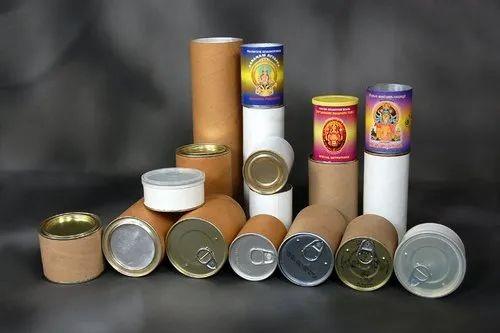IMARC Group’s “Composite Cans Manufacturing Plant Project Report 2025: Industry Trends, Plant Setup, Machinery, Raw Materials, Investment Opportunities, Cost and Revenue” report provides a comprehensive guide on how to successfully set up a composite cans manufacturing plant. The report offers clarifications on various aspects, such as unit operations, raw material requirements, utility supply, infrastructural needs, machinery models, labour necessities, transportation timelines, packaging costs, etc.
In addition to the operational aspects, the report also provides in-depth insights into composite cans manufacturing plant cost, process, project economics, encompassing vital aspects such as capital investments, project funding, operating expenses, income and expenditure projections, fixed and variable costs, direct and indirect expenses, expected ROI, net present value (NPV), profit and loss account, and thorough financial analysis, among other crucial metrics. With this comprehensive roadmap, entrepreneurs and stakeholders can make informed decisions and venture into a successful composite can manufacturing unit.
What are Composite Cans?
A composite can is a type of cylindrical packaging container made from multiple layers of materials, typically including paperboard, plastic, and metal. This multi-layer structure combines the strength and durability of rigid materials with the lightweight and cost-effectiveness of paper-based substrates. Composite cans are commonly used for packaging dry food products, snacks, powdered drinks, and non-food items such as adhesives or pharmaceuticals. They often feature a metal or plastic lid and a metal base to ensure product safety, barrier protection, and extended shelf life. In addition to being highly functional, composite cans are valued for their recyclability, customizable designs, and branding potential, making them a preferred alternative to traditional rigid packaging across diverse industries.
Market Trend and Drivers of Composite Cans:
The composite can market is being driven by a combination of sustainability trends, consumer convenience, and the growing demand for innovative packaging solutions. Increasing environmental concerns and regulations on single-use plastics are pushing manufacturers toward eco-friendly alternatives, with composite cans offering recyclability and reduced material usage. Rising urbanization and busy lifestyles are fueling the preference for lightweight, portable, and resealable packaging, particularly in food and beverage segments. Furthermore, brand owners are leveraging the design flexibility of composite cans for improved shelf appeal and differentiation in competitive markets. Growth in e-commerce also supports adoption, as composite cans provide durability and protection during transportation. With rising focus on circular economy practices and sustainable branding, the composite can market is poised for steady expansion across both developed and emerging economies.
Request a Sample Report: https://www.imarcgroup.com/composite-cans-manufacturing-plant-project-report/requestsample
Key Aspects to Setup a Composite Cans Plant:
- Location to Setup Plant
- Market Research
- Plant Layout
- Construction and Infrastructure
- Equipment/Machinery Procurement
- Documentation and Licenses
- Cost Analysis
Requirements to Setup a Facility:
- Funds
- Machinery
- Lands
Types of Costs to Setup a Factory:
- Land, Location and Site Development Cost
- Plant Layout Cost
- Machinery Requirements and Costs
- Raw Material Requirements and Costs
- Packaging Requirements and Costs
- Transportation Requirements and Costs
- Utility Requirements and Costs
- Human Resource Requirements and Costs
Project Economics:
- Capital Investments
- Operating Costs
- Expenditure Projections
- Revenue Projections
- Taxation and Depreciation
- Profit Projections
- Financial Analysis
Key Questions Answered in the Report:
- How has the composite cans market performed so far and how will it perform in the coming years?
- What is the market segmentation of the global composite cans market?
- What is the regional breakup of the global composite cans market?
- What are the price trends of various feedstocks in the composite cans industry?
- What is the structure of the composite cans industry and who are the key players?
- What are the various unit operations involved in a composite cans manufacturing plant?
- What is the total size of land required for setting up a composite cans manufacturing plant?
- What is the layout of a composite cans manufacturing plant?
- What are the machinery requirements for setting up a composite cans manufacturing plant?
- What are the raw material requirements for setting up a composite cans manufacturing plant?
- And more…
How IMARC Can Help?
IMARC Group is a global management consulting firm that helps the world’s most ambitious changemakers to create a lasting impact. The company provide a comprehensive suite of market entry and expansion services. IMARC offerings include thorough market assessment, feasibility studies, company incorporation assistance, factory setup support, regulatory approvals and licensing navigation, branding, marketing and sales strategies, competitive landscape and benchmarking analyses, pricing and cost research, and procurement research.
Services:
- Plant Setup
- Factoring Auditing
- Regulatory Approvals, and Licensing
- Company Incorporation
- Incubation Services
- Recruitment Services
- Marketing and Sales
Contact Us:
IMARC Group
134 N 4th St. Brooklyn, NY 11249, USA
Email: sales@imarcgroup.com
Tel No:(D) +91 120 433 0800
United States: (+1-201971-6302)

